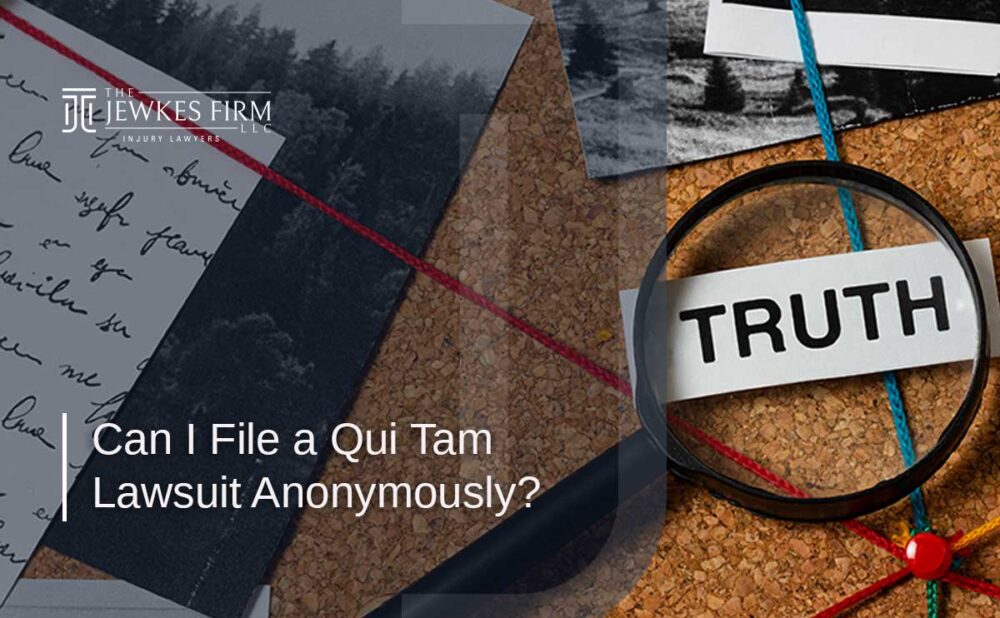Can I File a Qui Tam Lawsuit Anonymously?
If you’ve uncovered fraud against the government or suspect wrongdoing that harms public funds, you might be considering filing a qui tam lawsuit. These cases allow private individuals—known as “whistleblowers” or “relators”—to sue on behalf of the government and potentially receive a financial reward.
If you’re considering exposing fraud against the U.S. government through a qui tam lawsuit under the False Claims Act (FCA), you might be wondering about the possibility of remaining anonymous. The FCA does not guarantee complete anonymity throughout the entire legal process, even though it offers certain confidentiality protections.
At The Jewkes Firm, Attorney Jordan Jewkes understands the complexities and risks involved in whistleblower cases. This article will explain what a qui tam lawsuit is, the role of anonymity, and what you can expect if you decide to take this important legal step.
What Is a Qui Tam Lawsuit?
A qui tam lawsuit is a legal action brought under the False Claims Act (FCA), a federal law designed to combat fraud against government programs. A qui tam lawsuit allows private individuals, known as relators, to file a lawsuit on behalf of the government against entities that have defrauded federal programs. The term “qui tam” originates from a Latin phrase meaning “he who sues in this matter for the king as well as for himself.”
In these cases, a whistleblower exposes fraud—such as false billing, kickbacks, or other illegal activities—that causes the government to lose money. If successful, the whistleblower may receive a percentage (typically between 15% and 30%) of the recovered funds, which can be substantial.
Need To Do The Right Thing? Contact Us For A Free Consultation
Need To Do The Right Thing?
Can You Initiate a Qui Tam Lawsuit Without Disclosing Your Name?
Short answer: No, you cannot file a qui tam lawsuit completely anonymously.
When filing a qui tam complaint, the False Claims Act requires the whistleblower to submit a detailed complaint under seal (confidential status) to the court. This means:
- The complaint is kept secret from the defendant and the public initially.
- The government assesses the complaint and determines if intervention is warranted.
- The whistleblower’s identity is disclosed to the government but not publicly revealed at the outset.
While your identity is protected from public disclosure during the initial phase, it is not anonymous in the legal sense. The government must know who you are to evaluate the claim and proceed with the case.
Why is Your Identity Disclosed to the Government?
The government needs to verify the whistleblower’s credibility and the validity of the allegations. Your identity and information help:
- Assess the evidence you provide
- Communicate with you about the case
- Protect you under whistleblower protection laws
What About Public Disclosure and Privacy?
When you file a qui tam lawsuit, the complaint is initially filed under seal, meaning it is kept confidential from the public and the defendant. The government investigates the allegations for at least 60 days, or for several months or even years. The Department of Justice (DOJ) and your attorney are aware of the case, and your identity is protected during this time.
Limitations on Anonymity
While the sealed filing provides temporary confidentiality, it does not guarantee permanent anonymity. If the government intervenes and the case proceeds, your identity may eventually become part of the public record. However, courts and the government often take steps to protect whistleblowers from retaliation and harassment.
Can You Use a Pseudonym or File Under a “John Doe” Name?
Unlike some other types of lawsuits, qui tam cases generally do not allow filing under a pseudonym or anonymously. The whistleblower’s real identity must be disclosed to the government under the False Claims Act.
Courts may allow whistleblowers to proceed anonymously even after the seal is lifted. However, these cases are rare and typically involve extraordinary circumstances, such as credible threats to the whistleblower’s safety.
Legal Protections Against Retaliation
The FCA includes measures to safeguard whistleblowers from retaliation by their employers. If you face adverse actions such as termination, demotion, or harassment due to your whistleblowing, you may recover remedies including reinstatement, double back pay, and compensation for emotional distress and legal fees.
Strategies to Protect Your Identity
While complete anonymity is challenging to maintain, there are strategies to protect your identity during the legal process:
- Pseudonyms. Some whistleblowers file complaints using pseudonyms like John Doe or Jane Doe. Courts may scrutinize this practice, and it may be accepted or rejected.
- Corporate Entities. Filing the lawsuit through a corporate entity, such as a limited liability company (LLC), can provide a layer of anonymity. However, this approach has limitations. Your identity may still be revealed during discovery or court proceedings.
- Legal Counsel. Engaging an experienced qui tam attorney can help navigate the complexities of the FCA and explore options to protect your identity.

GEORGIA PERSONAL INJURY LAWYER NEAR ME
How Can The Jewkes Law Firm Help Protect Your Identity and Rights?
Filing a qui tam lawsuit is a serious decision that involves legal risks and potential retaliation. The law team at The Jewkes Firm will:
- Protect your confidentiality during the initial stages
- Advise you on whistleblower protections under federal and state laws
- Guide you through the intracate legal process
- Advocate for your rights and potential financial recovery
We understand the courage it takes to stand up against fraud and are here to support you every step of the way.
Consult with a Qui Tam Attorney
If you suspect fraud against the government, consulting with an experienced attorney like Jordan Jewkes at The Jewkes Firm can help you navigate the process safely and effectively. While the False Claims Act provides temporary confidentiality through the sealed filing process, it does not guarantee permanent anonymity. If maintaining your privacy is a significant concern, it’s crucial to consult with a qualified qui tam attorney to understand your options and the potential risks involved. Taking informed steps can help protect your identity while pursuing justice for fraudulent activities against the government.
For more information or to discuss your potential qui tam case, contact The Jewkes Firm at (770) 771-5130 for a confidential consultation. Experienced attorney Jordan Jewkes handles whistleblower cases and provides guidance tailored to your situation. Your courage could help protect taxpayers and bring justice to those who commit fraud.
Frequently Asked Questions
What is a qui tam lawsuit?
A qui tam lawsuit is a legal action filed by a whistleblower on behalf of the government to expose fraud against government programs, often under the False Claims Act.
How does the government protect whistleblowers?
The government keeps the complaint under seal during the investigation and offers legal protections against retaliation, including job protection and confidentiality measures.
What are the consequences if the government opts not to intervene?
If the government declines, the whistleblower can still proceed with the lawsuit independently. However, the case becomes public, and your identity may be disclosed.
How can The Jewkes Firm help me with a qui tam lawsuit?
Attorney Jordan Jewkes provides expert guidance on filing qui tam claims, protecting your identity, understanding your rights, and maximizing your potential recovery.
How long is a qui tam case sealed?
A qui tam case is typically sealed for at least 60 days. However, the case can be extended for months or even years, depending on the complexity of the investigation.
Can my employer retaliate against me if I file a qui tam lawsuit?
The False Claims Act protects whistleblowers from retaliation by their employers. You may recover remedies such as reinstatement, back pay, and damages if retaliation occurs.
How can I protect my identity when filing a qui tam lawsuit?
While complete anonymity is difficult, you can take steps to protect your identity, such as using pseudonyms or filing through a corporate entity. Consulting with an experienced qui tam attorney is essential to understanding your options.




